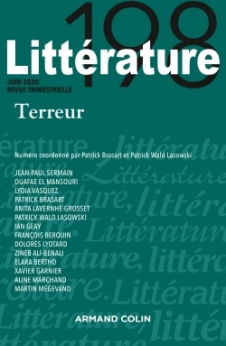
Littérature Nº198 (2/2020)
Pour acheter ce numéro, contactez-nous
Recevez les numéros de l'année en cours et accédez à l'intégralité des articles en ligne.
Marie-Jeanne Roland est guillotinée le 8 novembre 1793. « Femme forte » du gouvernement Roland dirigé par son mari, elle écrit en prison des Mémoires particuliers et des Notices historiques, en attendant « l’honneur d’aller à l’échafaud ». Témoignage unique d’une femme qui écrit sous le signe de la vérité, se sachant condamnée. Témoignage forgé sous le signe du paradoxe car, tout en se déclarant innocente face aux accusations de ses bourreaux, car elle « n’est qu’une femme », elle s’affirme supérieure à ces « êtres pusillanimes », ces « hommes qui n’en méritent pas le nom » et qui dirigent la destinée des Français en cette période de terreur.
Marie-Jeanne Roland is guillotined on November 8th, 1793. “Strongwoman” of the Roland government directed by her husband, she writes her Mémoires particuliers and some Notices historiques in prison, waiting for “the honor to mount the scaffold”. A unique testimony of a woman who writes under the sign of truth, as she knew she was condemned. A testimony formed under the sign of paradox because, while claiming herself innocent of the accusations leveled against her by her executioners, since she “is just a woman”, she asserts her superiority in front of these “faint-hearted beings”, these beings “who do not deserve the name of men” and who rule the fate of the French in this era of terror.

